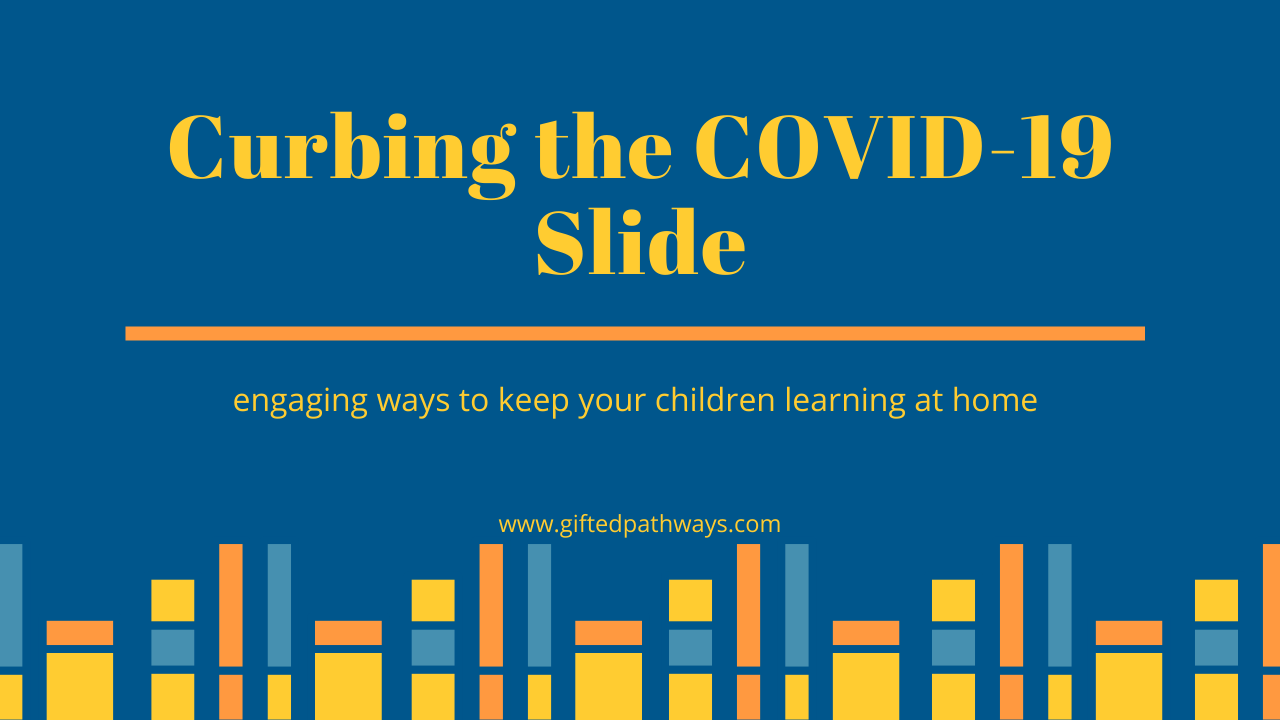Curbing the COVID-19 Slide

The summer slide is something that most families and educators are familiar with, it is a term to describe the loss of learning over a summer. The summer slide can be as extreme as a decline of 2-3 months of learning loss to just a two-week loss.
One of the reasons for the summer slide is known as the faucet theory. This theory is a comparison to the availability of resources at a school during the school year to water flowing from a faucet. During the summer, that faucet is turned off as with school closed, those resources are no longer available. This immediate (and unexpected) loss of resources is a reality for many homes during the COVID-19 pandemic.
We can and most likely will see the same thing occur because of COVID-19. We will have what will be called the COVID slide, you may already start seeing speculations about this learning loss popping up in your feed. Without data though, we will not know the true impact. So during this time, I want to offer some recommendations of how to try and curb the summer slide and COVID slide.
Read
Read, read, and read some more. When you are not sure what to do; read. I know this sounds like a broken record but reading is the one single act that has the most academic bang for its buck.
Here are some quick ideas:
- Let kids read whatever they want
- Have older kids read aloud to younger kids
- Allows kids to create their own videos of reading books to share with family members
- Let kids read under the table
- Or read with a flashlight in a closet
- Collect pillows and blankets to create a reading corner
Reading improves vocabulary, improves focus, helps to improve memory, and can reduce stress. The impact of reading is truly beyond measure. There are studies to show that just 20 minutes of reading a day exposes kids to 1.8 million more words per school year (by grade 6), and that kids with this reading habit score in the 90th percentile on standardized tests.
The best way for kids to be engaged in reading is for them to see their parents reading. Children mimic what they see. Consider starting a family “drop everything and read” time as a great way to kickstart this habit. Start small with just 5 minutes a day to build reading stamina, everyday add a minute or two.
Great reading sites:
- Read Aloud 15 minutes
- 25 Activities for Reading and Writing Fun from Reading Rockets
- Reading Activities for Parents and Caregivers
- Scholastic Learn at Home
Play Games
There is strategy and math in almost every game….shhh, I won’t tell if you don’t! Play games with kids. This is a fun way to refocus the brain and spend time together. Board games can help to build patience, teamwork, and critical thinking. Card games help to promote fine motor skills, pattern recognition, as well as a great deal of strategy. The time spent together also continues to form close relationship bonds which are even more important during traumatic times. I have fond memories of playing card games with my family, this is still one of my favorite things to do when visiting my grandparents.
Let that imagination run wild!
Imaginative play is when children role play, make up stories, or act out various experiences. This type of play helps build developmental skills.
Here are some ideas of easy imaginative play:
- Break out the legos (but not the directions) - build a giraffe, a spaceship, a house without any directions.
- Reenact a favorite story or nursery rhyme
- One person reads a story, while the other acts it out
- Build a fort
- Integrate objects like a box (is it a car? A ship?) or raid the closet for old clothes to dress up in.
After 18 years in education, I am confident that we will overcome this. Teachers have been offering incredible resources and going above and beyond. Look for the enrichment in the regular things we do, there are ways to incorporate learning in lots of different ways. Kids are naturally curious, we need to feed off that curiosity to help create engaged learning activities.
I am committed to helping parents and teachers find easy ways to engage their kids with fun reading and mathematics activities! Continue to follow Gifted Pathways on Facebook or Instagram for more resources on how to stay engaged while schools are closed. Click here to receive the Gifted Pathways newsletter.
Together, we've got this!
Love,
Ruth
P.S. If you enjoyed this list, you may also enjoy my FREE workbook, Six Strategies to Reach Your Gifted Learner. Click here to download it now!
